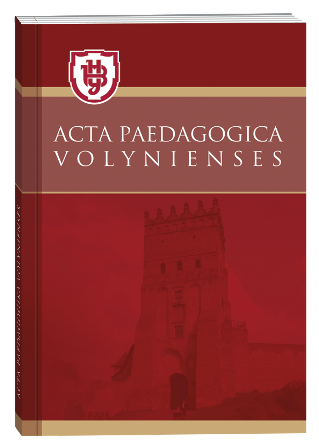ECONOMIC EDUCATION OF PRESCHOOL CHILDREN: DOMESTIC AND FOREIGN EXPERIENCE
DOI:
https://doi.org/10.32782/apv/2022.1.1.16Keywords:
economic education, preschool age, means of economic education, game, preconditions of economic education, family approachAbstract
The author emphasizes that economic education is able to enrich the socio-communicative and cognitive development of older preschool children. Through such knowledge of the world around, under the guidance of the educator, the child's deep mental work is carried out, which voluntarily follows the rules that contribute to the preservation of energy and health. Based on the study of domestic and foreign scientific literature, the author points out the following opportunities for the child's interaction with the real world in the financial context: this is learning on the basis of requests; and the development of critical thinking; and taking into account the variety of approaches to solving problems; and interdisciplinary action-based communication, and the use of role-playing and modeling; and cooperative learning for deep experience; and the use of children's literature; use of child pretending/socio-dramatic action, involvement of families and community. The scientific publication emphasizes that the effectiveness of economic education can be achieved through its continuity and logic, which is ensured by the phasing of this process. The main idea is that in the process of economic education of preschool girls and boys, the vocabulary is enriched, there is a healthy interest in money, fears of winning are overcome, the desire to interact and achieve the goal is more active. Economic education in preschool education is considered by the author as a pedagogical process of purposeful action of teachers aimed at forming awareness of girls and boys of preschool age on basic economic concepts, their knowledge of cost, rational and consumer content of human life. Regarding economic education in the family, it is noted that it is important not only to involve the child in the economic subsystem, but also the nature of such involvement.
References
Базовий компонент дошкільної освіти (Державний стандарт дошкільної освіти), нова редакція. Затверджено наказом МОН № 33 від 12.01.2021 р. URL: https://mon.gov.ua/storage/app/media/rizne/2021/12.01/nakaz-33-bazovyykomponent-doshk-osv.pdf (дата звернення: 04.01.2022).
Богуш А.М., Варяниця Л.О. Діти і соціум. Луганськ : Альма-матер, 2006. 368 с.
Гавриш Н., Пометун О. Бути чи не бути – ось у чому питання. Вихователь-методист дошкільного закладу. 2015. № 3. С. 4–10.
Закон України «Про дошкільну освіту». Урядовий кур’єр. 2001. № 141. С. 1–8.
Москальова Л.Ю., Жейнова С.С., Єрьоміна Л.Є. Формування творчої особистості дитини передшкільного віку як соціальна потреба сьогодення: аналіз закордонних досліджень. Науковий часопис НПУ імені М.П. Драгоманова. Серія 5 : «Педагогічні науки: реалії та перспективи». Київ : Вид-во : НПУ імені М.П. Драгоманова, 2019. Вип. 69. С. 136–139.
Birbili M., Kontopoulou M. Financial education for preschoolers: Preparing young children for the 21st century. Childhood Education, 2015. 91 (1). 46–53.
Cerbasi G. Pais inteligentes enriquecem seus filhos. 1 ed. Rio de Janeiro : Sextante, 2011. 176 p.
Hogarth J. Financial education and economic development. Paper presented at Improving Financial Literacy: International Conference Hosted by the Russian G8 Presidency in Cooperation with the OECD, 2006. November 15, 2017. URL: http://www.oecd.org/dataoecd/20/50/37742200.pdf
Johnson E; Sherraden M. From financial literacy to financial capability among youth. Journal of Sociology and Social Welfare. 2007. 34 (3). P. 119–146.
Mccormick Martha Henn. The Effectiveness of Youth Financial Education: A Review of the Literature. Journal of Financial Counseling and Planning. 2009. Volume 20. Issue 1. P. 70–83.







